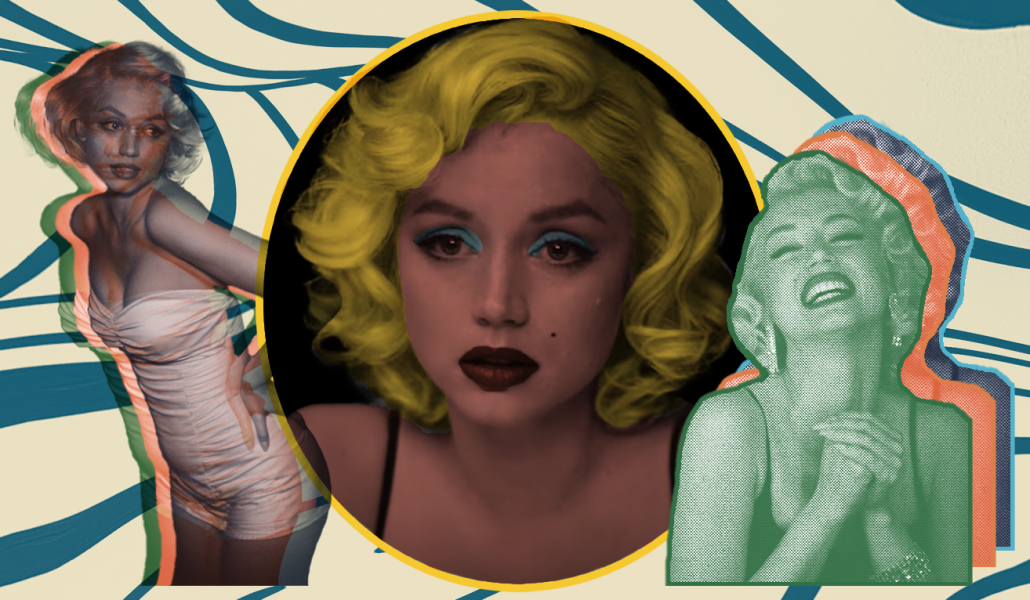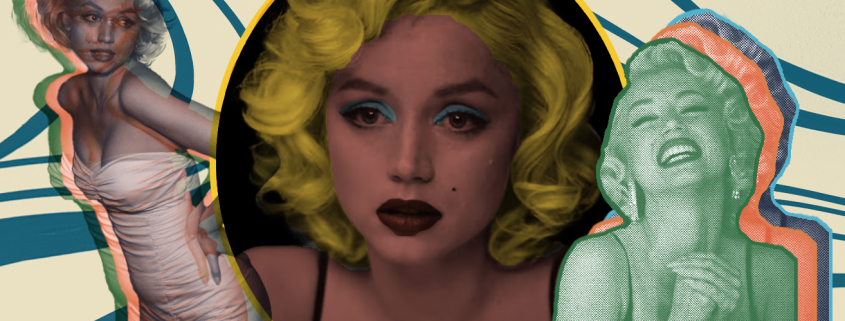‘BLONDE’ is a dumb agent of dehumanization

(Michael Castellanos | Daily Trojan)
“Watched by all, seen by none” is the tagline for director Andrew Dominik’s “Blonde,” Netflix’s new NC-17-rated, polarizing portrait of Hollywood icon Marilyn Monroe. The phrase is undeniably ironic, not because it is untrue, but because, over the course of the film’s nearly three-hour runtime, Dominik turns his central subject into a spectacle — a sad, sparkling vestige of a woman whose life is painted in brushstrokes of anguish. Although it claims to be a sincere portrait of Monroe’s life, the film invites the audience to bear witness to her misery, even indulge in it, making for a hellish retelling of the Marilyn myth.
“Blonde,” based on Joyce Carol Oates’ novel of the same name, is essentially a fictionalized ode to the idea of Marilyn Monroe: her life, her lovers and her low points — of which there are several. Ana de Armas stars as Monroe in a captivating performance that is perhaps the sole redeeming quality of “Blonde,” a representation she injects with so much emotion that, if not for the disturbing and distasteful nature of the film, would be impossible to look away from. If de Armas was compensated per tear, she would be one of the highest-paid actresses of 2022.
De Armas’ embodiment of Monroe is so believable that one occasionally feels as though Monroe herself has been resurrected, although, as she breathily insists in one scene, “Marilyn Monroe only exists on the screen.” The film acknowledges that the public has long possessed a fascination with fantasy, depicting the tempestuous media frenzy Monroe was at the center of. Throngs of reporters and raucous fans attempt to see her, to touch her, but never to know her.
That’s not to suggest that the filmmakers had malicious intent. De Armas confessed that she and the “Blonde” crew visited Monroe’s burial site in Westwood to ask permission to tell her story.
“Everyone felt a huge responsibility, and we were very aware of the side of the story we were going to tell — the story of Norma Jeane, the person behind this character, Marilyn Monroe. Who was she really?” she said.
What de Armas and the crew really should have asked for, though, was Monroe’s forgiveness.
Watching “Blonde” will make you want to take a long shower — probably the only cure for its lingering stench. It spares no uncomfortable detail when it comes to showcasing the ways in which Monroe was mistreated and routinely exploited by the men in her life. From being raped by a studio head referred to only as “Mr. Z,” to being physically abused by her partner Joe DiMaggio and thought of as nothing more than a booty-call by John F. Kennedy, Monroe is reduced to a mere object. You can now add Dominik to the list of men who have treated her as such.
Dominik proves to be a rather self-indulgent director by capitalizing on the deep-rooted romanticization that has become routine when recounting Monroe’s life story. The film focuses heavily on Monroe’s body, engaging in blatant objectification — de Armas is topless for a solid chunk of it — rather than making the effort to venture inside its central character’s mind. In doing so, “Blonde” and its creator engage in the same patterns of behavior that they claim to condemn.
It is for this reason that “Blonde” plays out more like a horror film than a fictionalized biopic, or, rather, a speculative dive into Monroe’s soul. It is about the ghosts of a woman’s past haunting her adult life, although in this case, the phantoms have persisted well past her death.
Ultimately, “Blonde” doesn’t celebrate Monroe’s legacy; if anything, it actively dishonors it. The result is an extended cinematic nightmare that perpetuates a harmful fantasy about a very real woman, a woman whose legacy extends far beyond the shade of her hair.

